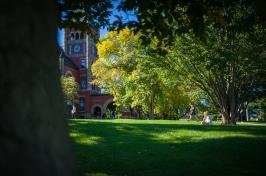
This September, as national Healthy Aging Month raises awareness of the physical and mental health of older adults, some UNH researchers shared their expertise and tips for maintaining health across the lifespan.
Stay Strong
“ ‘Use it or lose it’ holds true in regard to muscle mass and strength. As individuals age, there is a natural loss of muscle mass and strength that can be detrimental to overall physical function. Increasing physical activity and exercise levels, or even just remaining active as one ages, can preserve muscle mass, strength, physical function and quality of life.”
— Summer Cook, associate professor of kinesiology
Cook studies and conducts research in the areas of aging, neuromuscular function and resistance training.
Join In
“There are various factors impacting healthy aging, but if I had to pick just one, I would choose social participation. Social participation supports physical, cognitive and psychological well-being while providing a valuable social network of support and a sense of purpose.”
- BoRin Kim, associate professor of social work
Kim’s research, which uses a nationally representative longitudinal sample of older adults, has shown that regular participation in social activities — such as joining clubs, attending organized events, volunteering or going to religious services — is linked to improved psychological well-being in older adults, including those with multiple chronic conditions or functional limitations.
Mind the (Digital) Gaps
“Technologies like artificial intelligence, robotics and smart devices can making healthy aging and aging in place far easier and more efficient. But we need to include older adults in the design of these technologies, to be sure the interface takes into account some of the physical and cognitive skills that decline as we age, as well as older adults’ outlook on technology, specifically concerns around ethics and privacy.”
- Sajay Arthanat, professor of occupational therapy
Arthanat and Momotaz Begum, associate professor of computer science, collaborate on research that creates, tests and implements innovative technologies such as robotics and smart devices to support aging in place, with an emphasis on conditions like Alzheimer’s disease or progressive dementia.
Stay Connected
“What we know about healthy aging is that there is no formula. We all age uniquely. Genetics can be a factor in how we age but aging is also impacted by the social determinants of health, or non-medical factors that influence health outcomes.”
- Jennifer Rabalais, co-director of UNH’s Center on Aging and Community Living
Rabalais and Therese Willkomm, clinical associate professor emeritus, are concluding a pilot project using FaceTime on an iPad or video calls on an Amazon Echo Show to reduce social isolation by increasing social connections with family and friends using hands-free virtual assistants for video drop-ins.
Foster Support Systems
“Healthy aging is not just about the individual — it involves caregivers, family and the broader community. It’s not something that happens overnight; rather, it’s a lifelong trajectory that begins with the choices we make today. By fostering strong support systems and encouraging community involvement, we can all contribute to the process of healthy aging.”
- Jing Wang, assistant professor of nursing
Wang’s research focuses on the intersection of aging, person-centered care and community engagement. She explores how families and communities play a critical role in supporting healthy aging, particularly through caregiving practices, social support networks and culturally informed health strategies.
-
Compiled By:
Beth Potier | UNH Marketing | beth.potier@edgepointedges.com | 2-1566





















































